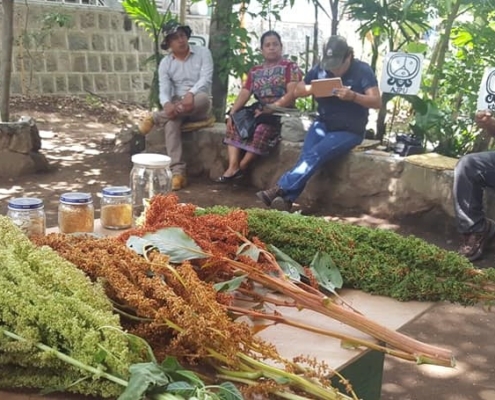Yes, here’s why.
Guatemala’s small farms have limited funds to grow their produce is why they do not use chemicals.
In Guatemala, small farms often have limited funds, which can contribute to their reduced use of chemicals in agriculture. However, several additional factors influence this practice:
There is a growing movement towards sustainable and glyphosate-free agriculture in Guatemala. Organizations like the Mesoamerican Permaculture Institute (IMAP) promote agroecological practices that avoid chemical herbicides, focusing on traditional knowledge and biodiversity preservation.
Traditional and Sustainable Practices
-
Traditional Knowledge: Many small farmers rely on traditional farming methods that have been passed down through generations, often emphasizing natural and organic practices.
-
Sustainable Agriculture: There is a growing awareness and adoption of sustainable agriculture practices that minimize chemical use, such as crop rotation, intercropping, and the use of organic compost and natural pest control methods
-
Consumer Preferences: There is increasing demand for chemical-free produce, both locally and internationally. Farmers who grow their produce without chemicals can cater to this market, often commanding higher prices.
In Guatemala, as in many other countries, eggs are not typically refrigerated for several reasons related to local practices, regulations, and differences in egg handling and production methods. Here are the key reasons why eggs are not refrigerated in Guatemala:
1. Protective Coating
-
Natural Coating: Eggs have a natural protective coating called the cuticle or bloom, which helps prevent bacteria from entering the egg. In many countries, including Guatemala, this coating is left intact.
Ceremonial Cacao interests have grown worldwide and in Guatemala, many offer cacao for sale. As such I advise caution. We find that cacao hulls and the leftovers are sold as teas. Cacao hulls or skins sold as teas can potentially contain contaminants, including heavy metals, if not properly sourced and processed. Here are some key points to consider regarding potential contaminants in cacao hull teas:
Contaminants
-
Heavy Metals: Cacao plants can absorb heavy metals like cadmium and lead from the soil, which can then be present in the hulls or skins.
-
Microbial Contaminants: Improper handling and storage can lead to contamination by bacteria, molds, or yeast.
-
Source Verification: Ensure the cacao is sourced from reputable suppliers who practice sustainable and safe farming methods.
-
PFAS: These compounds, including Teflon, are found in everyday items and the blood of 99% of Americans and people worldwide.
-
Purchase only from Mayan producers, not expats.
Guatemalan food is safe
By understanding and appreciating local practices, you can enjoy the diverse and delicious food that Guatemala has to offer with confidence.
Whether it’s farm-fresh eggs, vibrant market produce, or rich cacao products, Guatemala provides a wealth of safe and healthy food options for both residents and visitors.


 Ethical Fashion Guatemala
Ethical Fashion Guatemala Ethical Fashion Guatemala
Ethical Fashion Guatemala